An account of the journey on foot that has been drawing pilgrims since the Middle Ages. Believers and non-believers join together in a quest for spirituality. An adventure I wanted to experience.
The pilgrimage to Santiago was one of the great cultural undertakings of
the Middle Ages and perhaps the most extraordinary adventure a person
could have. Traveling to the supposed tomb of Saint James the Apostle,
pilgrims from all over Europe for centuries suffered the certain dangers
and grueling rigors of the road. They did this for both religious and non-religious reasons - the latter practice sometimes being called 'curiositas'.
(Pilgrimage to the End of the World, Conrad Rudolph)
This is not a diary, but rather a selection of notes jotted down during a month on the Way of St. James, the 1,200-year-old pilgrimage route to Santiago de Compostello. There are a number of caminos or roads starting from various points in Europe, which converge on Santiago, including three magnificent routes in France. This account describes the camino frances across northern Spain, the most frequented and famous of all. It does not pretend to be representative of the modern-day pilgrimage experience —, in my case a 220-mile walk —, but it does reveal, as I discovered, how deeply personal that experience often is.
Spain
When the train reached Irun, I was fast asleep. The door opened suddenly, and a conductor said, 'Hurry, Señora, the train is about to go back to Paris.' I grabbed my backpack and my boots and jumped off. I stood on the platform in my socks, happy as a clam. The conductor laughed and said, 'Buen camino!'
If it weren't for the dark eyes and raven hair of the Basque people and the red roof tiles, it could be Switzerland. The foothills of the Pyrenees are very green, with patches of bright yellow gorse and red poppies. There are acacia trees with huge clusters of blossoms that look like lilies-of-the-valley.

I knew I was in another country when I was served a donut with a knife and fork in the station cafe. I looked around, and sure enough, there was an old man tucking into a croissant with his knife and fork.
I waited for an hour on the platform for the train to Pamplona, watching fluffy dandelion seeds carried on the morning air. As I sat in the sun, it seemed like a whole layer of tension just peeled off and vanished all by itself. I realized I hadn't stopped to contemplate —, really contemplate —, anything in ages.
When I reached Pamplona, I wandered around the streets getting the feel of Spain again after more than thirty years. I went to the Archbishop's Palace and got my credenciel which was duly registered and stamped, so I'm now an official pilgrim, starting out from Puenta de la Reina.
All this is superficial, of course, but I'm still on the surface on this journey. It will go inward, but that takes time.
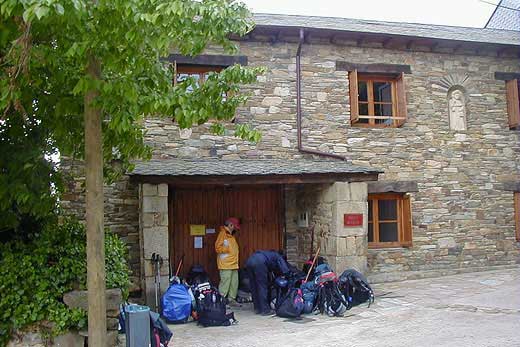
Puenta de la Reina
The dormitory is occupied mainly by white-haired men. I suppose it is too early in the season for working people, so the average pilgrim here is a retired person.
There appear to be only three solo women in this hostel: a German girl, a giant Scandinavian woman and myself. The men are mostly in groups, synchronizing their watches to see who will do the stage in record time. Is this a fundamental gender difference? There are couples, of course, who always seem to have matching backpacks, boots and jackets. The only thing that bothers me about the highly organized hostel set-up is that the pilgrims tend to move in a bubble, cut off from the people who live here, like an island unto themselves.
I went into a beautiful old church last night on my way to dinner: There was San Miguel over the altar and a wonderful painted wooden statue of St. James in his cloak, wearing an odd pointed cap, with the two symbols of the pilgrim: a scallop shell pinned to his coat and a staff in his hand. I saw a pilgrim there lost in prayer. I felt a little pang of jealousy. It was all so much easier when God was there to make sense of it all. Now I have to sort it out myself.
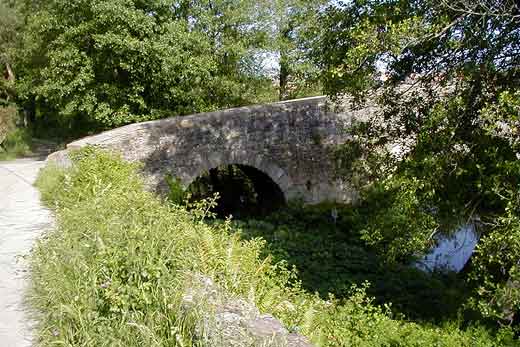
Day One
I just got in, hot, tired and happy. It turned out to be a very challenging day —, 23 km with two 'mountains' and many hills. Lots of paths through fields full of wildflowers, more red poppies, bright purple thistles, pink heather along the way and a variety of cornflower. Heard all sorts of birdsong and a lone cuckoo echoing across a field from a pinewood. I'm still hoping to hear a nightingale.
I walked most of the route alone, but met up with a group of solo people, Australians and a Brazilian. We had lunch and did some of the walk together this afternoon. Everyone wants to talk about spirituality and they usually begin by saying they are not religious.
On my way
I spent most of today in silence and I feel wonderful. I slept for ten hours last night and walked 20 km without any pain, so everything is great. I went into a little shop and bought bread, cheese, sausage and fruit, which I've been eating it for three days as a picnic lunch.
The landscape is changing. It looks like the Midi of France, with scrub and stony, clayey vineyards and little stone huts like the borys in Provence. I lay down under some giant pine trees and listened to the birds, felt the breeze, and all the noise in my head just stopped. It was heavenly.
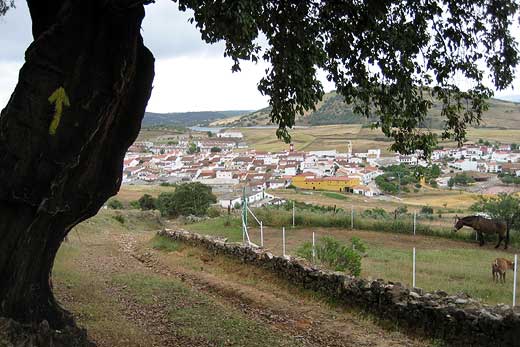
Just follow the arrows
I know the name of the town I'm heading for, and I keep my eyes open for the yellow arrows that are painted on stones, trees, telephone poles, fences, etc. to show the way. Otherwise, I have no idea where I'm going, and I'm starting to accept that. There are very few pilgrims walking alone. I have settled on about 20-22 km a day. More than that is too painful.
I am experiencing first hand what I have always known —, that I am happiest with nothing. My rucksack is now down to about 12 lbs., at least a third of it is water and food. I love living like a snail, with only the vital necessities on my back (and in my heart).
La lengua
I am thrilled when I reach the top of a hill and look out into the distance that just goes on and on. The hostels are rather Spartan, but the food is good, the wine cool and delicious, and the people all friendly and helpful, speaking to you as though you understood every word, and somehow you do. The linguistic part has been a real joy —, I find I can understand much more than I ever imagined, but I can only make halting sentences. No one seems offended and everyone smiles. To my astonishment, I found myself playing interpreter for a Swiss German hospitalier who wanted to explain the ropes of the hostel to a group of pilgrims but couldn't speak French or English. For someone trying to still the inner cacophony, I seem very preoccupied with language...
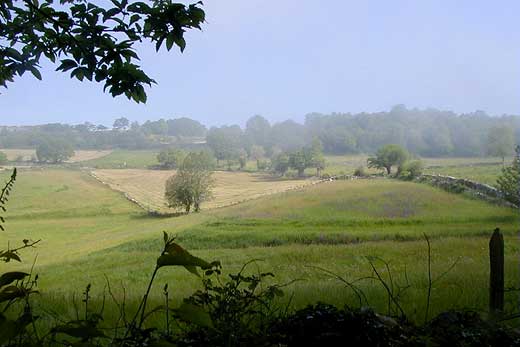
La Rioja
I have been walking in the province of Rioja - wine country! It reminds me of Burgundy, hilly, with patchworks of green fava bean fields, ruddy vineyards, bright yellow colza fields, and always, a little path weaving its way over the hills.
I had a long talk with a man who is walking with a donkey named Mathurin. He said, 'I know this animal well. He won't carry anything unless I carry at least a small backpack.'
One of the things I have learned for good is that there is no going back. Every day I start out lighthearted and full of energy. I am learning how to handle pain in the knees (taking the downhill parts slowly). It has often been pretty unbearable, but I find if I just keep going, it usually eases up. I realize how lucky I've been with my feet when I observe everyone engaged in a half-hour of elaborate foot care every morning before starting out. My magic boots have saved me, and I stop every now and then and put my feet up and look at the sky, which is always full of lovely clouds.
The heart has reasons
Last night I slept on a little mat in the choir loft of a church in Azofra, where the overflow of pilgrims found refuge. During the day, I walked for a while with a man who is back doing the second leg of the camino. He said he decided to come after a heart attack. He told me he had begun to think about his life and realized he had spent most of it suppressing his emotions. He said he had always confused emotions, which should not be suppressed, with sentiments, which can be controlled and directed. Why does it take us so long to understand such basic things?

A wish fulfilled
I have come to love the stillness so much that today, when I arrived in Burgos, I was overwhelmed by the noise, cars, people, etc. and longed to get back on the empty road. I'm leaving tomorrow morning for Sahagun, where I hope to do three days in the Meseta, which is completely flat and treeless. That will mean leaving at 6 a.m. and arriving around noon, when the sun starts beating down.
I finally heard a nightingale. It sang outside my window for two hours the other night in a little town called Viana, where I dined on calamares and asparagus. Afterwards, I sat outside with a group of pilgrims —, Panamanians, an Austrian, a Brit, some Aussies, a couple of Germans, etc. —, and then went to bed, not realizing I was about to hear a nightingale at last.
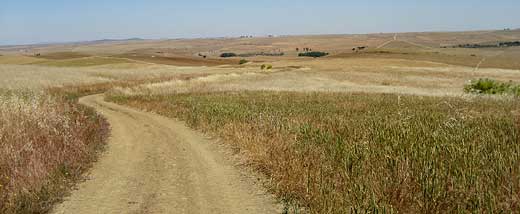
Going deeper
This is my day off, after a bus ride from Burgos across the first part of the Meseta, which is the way I imagined northern Spain —, empty and treeless, with an endless pilgrim's path leading to the horizon. There must be a bit of flight in this journey, though the question 'Where do you come from?' is starting to be replaced with 'Why are you doing this?' Many of us have no clear answer to that.
There have been times, sometimes in the middle of nowhere, sometimes in dark little village churches, when I've found myself crying my heart out. I wonder if that isn't just the flip side of intense joy, or at least the first intimation that I'm getting below the surface, where whatever one feels is felt deeply.

I've been wrestling with the problem of truth and meaning. It is a little discouraging to realize they are the same questions I had when I was twenty. What is most important in life? Is there such a thing as 'the meaning of life'? How can we know the truth about anything? My son Matthew keeps reminding me that in the postmodern world there is no such thing as 'Truth' with a capital 'T', there are only things that are true in a specific context. In a nutshell, there are no absolutes. I'm ready to let go of absolutes —, I have always been wary of them —, but I don't want to throw the baby out with the bath water.
I was accompanied for a long time by a pair of white butterflies and heard two nightingales in a little wood.
A day of “miracles”
They say that the first week is physical —, your body is your main preoccupation - the second is mental and the third is spiritual. I should be in the mental phase, and in a way I am, but the physical keeps coming back to haunt me. I thought, after a day of rest, today would be a piece of cake. It turned out to be very painful, after the first 12 km. Since I was doing 20 km, it turned out to be a rather harrowing walk. Despite my treacherous knees, it was a day filled with little miracles.
There were two possible routes today, so I took “the road less traveled by.” I was the only pilgrim walking on what was once the Roman road across northern Spain. At one point, the path split in two different directions, and there was no yellow arrow to indicate which way to go. I stood there in a quandary, wondering what to do. After a while, I looked down and right there, in front of me, embedded in the ground, was an arrow made of stones, pointing to the left.
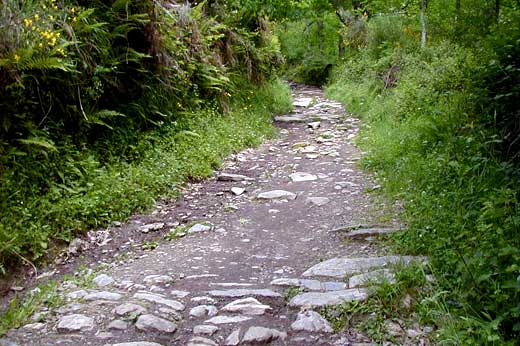
I followed it and finally came to a little town after another 10 km. There was a tiny restaurant where I had breakfast, served by a little girl with huge chocolate eyes. After breakfast, I admired a scallop shell on the mantel, and the woman who ran the restaurant pressed it into my hands saying it was for me, la peregrina. (I can get rid of things, but what about gifts?)
I left the town and walked for a while on the road, which has been paved since the Roman conquest. I found myself walking opposite an old man pushing a wheelbarrow full of grass in the other direction. Just at that moment, a car came racing down the road at 80 miles an hour and whizzed by. I looked across the road at the old man and we both burst out laughing.
Finally, as I was hobbling towards the albergue, a man came riding up on a bicycle. He hailed me and asked where I was from. Français? Deutsch? And then he explained he was the parish priest from the next town. He pulled out a sheaf of papers and took a sheet, which he signed with a flourish and handed to me. Then he blessed me —, wounded knees and all —, right there on the side of the road.
The paper contained a poem essentially asking why the pilgrim is following the way of St. James, 'What force is pushing you forward, what force is drawing you on? You can't even explain it to yourself.'
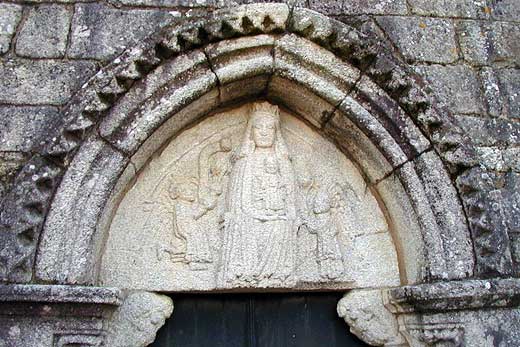
The story of the staff
I didn't want to buy a walking stick, and thought I would find a nice one while passing through Navarra or Rioja. Alas, thousands of pilgrims had already passed by and picked the woods clean. So I walked on without a staff.
This morning, after I came out of the cathedral of Leon —, so many stained-glass windows it is like being inside a kaleidoscope —, I was walking down a little street and a street cleaner came up to me with a staff in his hand. It is quite lovely, with the wood turned in an interesting way, and very light. He explained that he had found it, had no use for it, but since I was a pilgrim, I should have it. Another gift. I am now a full-fledged pilgrim with my shell and my staff given to me.
It was cold and rainy this afternoon, which was not conducive to insight or wisdom. I just put one foot in front of the other, and wondered why.
Milestone
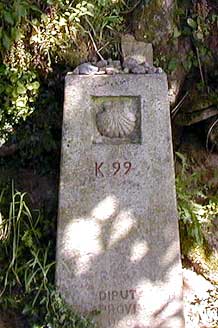
Today I passed the stone marker saying 100 km to Santiago. I just stood there and wanted to weep and jump for joy at the same time. Weep because I haven't solved anything, jump for joy because, though I have had to skip stages, etc., I think I can actually reach Santiago.
Some notes from my guide:
Walking: the action of walking, mode of locomotion —, an action that is not innate but is learned. Walking reveals itself to be like free, inexhaustible energy.
Pilgrim: from the Latin peregrinus, derived from the root per ager (across fields). A state in which the traveler becomes a foreigner. A universal symbol of the transitory nature of every situation and of detachment from the present.
Pilgrimage: an individual or collective journey... A pilgrimage is a form of travel undertaken as an initiatory quest or in search of self-knowledge, ridding oneself of things and of one's tasks and a rebirth.
The uphill battle
I have learned (and it's not over) a lot about pain management, which is why I am still walking when so many have had to stop. Every time I start feeling really confident (I've got this down now, etc.), I come to what I call a 'humility hill', a steep hill or small mountain that I have to climb and descend, both of which are a problem for this pilgrim. Today there were four of them. I just take my time. I usually arrive at the albergue after everyone else, but that is also because I have lain in the grass and looked at the sky and watched the butterflies.
Searching
The pilgrim population is changing. Because I have had to skip stages, I am meeting a different group of people: this time there are many single women, some young, most middle-aged, some in their late sixties or early seventies. There are quite a few cancer survivors, many recent divorcees, lots of New Age women looking for 'power', whatever that is. There are also young men, fresh from college, seeking a challenge. And then there are people like me with no apparent reason for being here.

Yet all the people I am meeting seem to share one thing: each one of us has reached a turning point in our lives and the camino offers a chance to take stock of where we have been and think about where we're going from here. There is a welcome simplicity about spending long days of solitude in nature, far from the distractions of everyday life, experiencing the joy of making our bodies strong, sleeping like babies at night, and starting out the next day with the same sense of adventure and exhilaration as the day before.
There has been a running discussion among some of the pilgrims about destiny vs. chance. Many seem to find courage (or solace) in the idea that everything is part of a great plan, e.g. when you meet someone, it is because that person has something to teach you, when you walk the camino, it is because you are ready for it and called to do it, etc. I am always very quiet during those discussions, because I don't think the script is written, though I do realize that we don't write it alone and hence have only a limited amount of freedom to write our part of it.
I keep thinking of Sartre vs. Camus. They agreed that meaning not does arise from the natural order, but from human action, but whereas Sartre insisted on our freedom to create meaningful lives for ourselves, Camus saw life as inherently meaninglessness and the hero as a tragic figure because he knows this and embraces life in spite of it.
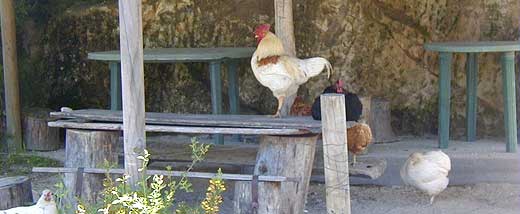
Galicia
It has been an extraordinary day, in the sense that I walked 26 km without a hitch, despite going uphill all morning long, and I could have gone on for another five or so. Where did this energy come from? I feel like an Amazon. My face and arms are brown, my legs are strong and hard, and my loose-fitting pants tell me I have lost weight, which is not surprising as I don't eat much now, I just drink - water, fruit juice, coke and a little wine or beer.
I have been walking through Galicia for several days now and I find it the most interesting, varied and beautiful part of the camino. It is a very rich, traditional land with its own language —, one of the four official languages in Spain, along with Spanish, Catalan and Basque. The stone houses in the villages are reminiscent of Brittany. Each one has a glorious kitchen garden, often with lilies and big, wonderful-smelling roses. There are cherry and plum trees in bloom everywhere.
The forests are magical, like a setting for The Lord of the Rings. They are dark, with ancient oak and chestnut trees, some with huge trunks hollowed out like small dwellings, and I half-expected to see hobbits sitting on the threshold drinking tea. Sounds are muffled by a carpet of ferns and moss. Sometimes a tiny waterfall appears in a corner. Then suddenly you emerge into a wide field marked out with low stone walls, full of daisies and buttercups and caramel-colored cattle grazing. Today the landscape seemed to change, though I couldn't quite tell how until I realized this afternoon that the trees were casting a different shadow. When I looked up, I saw they were eucalyptus.
(Sur)real
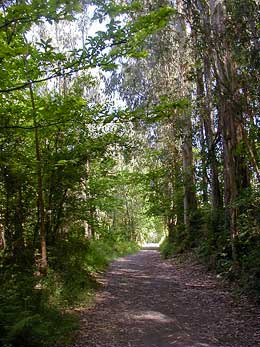
Every now and then the “real world” suddenly appears in the midst of the camino, but curiously, instead of being a reality-check, it seems surreal.
Surreal: sitting outside a tiny cafe in a little town after Leon. As I drank my cafe con leche, I heard wafting from the radio inside: 'We all lose our charms in the end... These rocks won't lose their shape, Diamonds are a girl's best friend.' I laughed until tears came to my eyes, picked up my staff and went on.
Surreal: going into town in Villafranca del Bierzo. I had just washed my pants and had only shorts to wear, which bothered me, as I remembered buying a dress in desperation 35 years ago in southern Spain, where young women in pants were rare and frowned upon. But I thought, they must be used to peregrinas by now, so I went to visit the town anyway. As I approached the town hall, an old man came out of nowhere towards me crying 'Que tal? Que tal?' as he lunged at my thighs. I realized he was completely. I gently removed his hands, said “Muy bien, señor' and slipped away, leaving him bewildered but not humiliated. Another chapter missing from the feminist manuals.
Making my way
I've made a little headway in my reflections, working on the idea that the camino is just one long metaphor for life and our journey through it. (I know that's horribly trite, but it has been like a silver thread for many days.) I've spent a lot of time thinking about the paradox of the point of view of the cosmos vs. the point of view of human beings. Seen from on high, the camino must look like an abstract painting, a long pale ribbon winding across the land. The pilgrims are nothing but countless black dots all moving in the same direction, all alike, infinitely replaceable and in fact, new dots are constantly starting out as others leave. From the point of view of the pilgrim, it is a very different story. Each one is a flesh-and-blood person carrying a world inside, unique, irreplaceable. From the point of view of the cosmos, human lives don't matter or mean anything, but from our point of view, they are what matter most and the source of all meaning. The point of view of the cosmos does not contradict the human perspective, it is incommensurable with it.
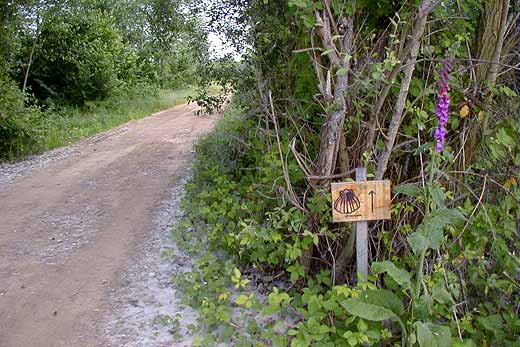
This wouldn't be a problem if we didn't want to make sense of our experience, which implies reconciling these two irreconcilable scales or points of view. This leads me back to wondering why we seek meaning in the first place. When we talk about 'making sense' of our experience, does that mean formulating it in a way that allows us to act (i.e. deduct a course of action that flows 'logically' from our formulation)? And if so, is this a biological imperative, required for our survival? Can we really live (or live well) without meaning?
Today the stone marker said 66 km to Santiago.
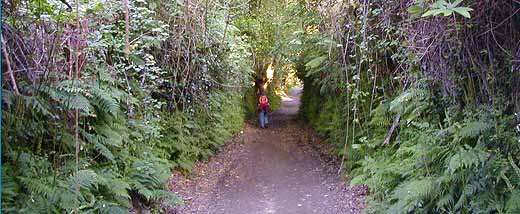
The end in sight
I was dragging my heels all day, knowing it is almost over and somehow wishing I could make it last longer. It just gets better and better —, yesterday I walked 27 km and was fine except for the heat. I don't know why it took me so long to take off, but I feel as though I could go on indefinitely.
I have the impression that all these days of thinking have merely served to refine my questions without bringing any answers, or even a flash of insight. It is a standing joke to ask people if they have had their 'illumination' yet. I met a lovely couple doing the camino for the second time. When I told them I wasn't ready for it to end, the fellow said, 'Yeah, I know, all that shit is still in there, isn't it?'
When I logged onto the Internet today, I found this from my children —, yesterday was Mother's Day in France:
Dear Mom,
We are sending you a cyber-breakfast with some cyber-croissants and cyber-flowers to celebrate YOU, for mother's day! We are thinking of you, walking your way to Santiago.
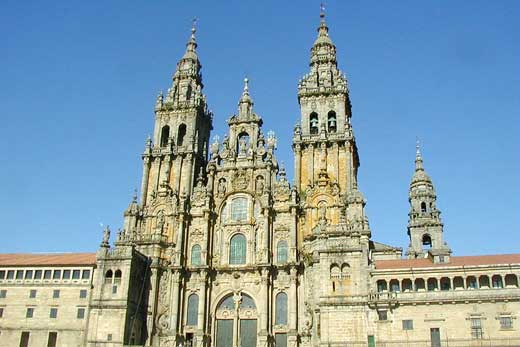
Arrival
This morning the mood was almost electric in the pilgrim's hostel (it is hard to imagine getting so excited unless you've been on the road for such a long time). Everyone was filled with anticipation, calling out 'See you in Santiago' but hardly believing it.
I thought about pilgrims in the Middle Ages, the fears they must have had, the great challenges they faced —, not just brigands and bad weather, but illness and losing their way and the fact that when they arrived they had to turn around and walk home. When I was approaching Santiago, I saw a group of pilgrims walking towards me, away from the city, and stopped in my tracks and asked, 'Are you walking home?' And one of them answered, 'Yes, home to the airport.' Today, with the yellow arrows to show the way, the refugios with beds, toilets, hot showers and the little bar-restaurants along the way, we have all the basic creature comforts and just have to walk.
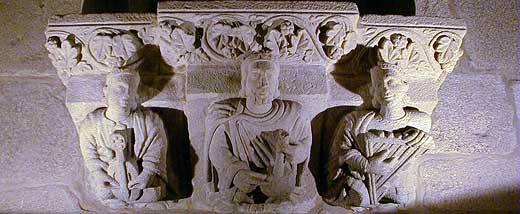
The old city of Santiago is beautiful with lots of little cobblestone streets, churches, cafes, etc. The atmosphere is very southern, but somehow unspoiled despite the daily arrival of I don't know how many pilgrims. I got my parchment pilgrim's diploma from the pilgrim's office where they studied my credenciel stamped each day at the hostel and decided I was worthy.
Tonight we celebrated. There were about 25 people at our table from all over the world. We ate and drank generously, sang an old pilgrim's song in French and then went to the plaza in front of the cathedral where there was a group of musicians in Renaissance costume playing ancient instruments. By that time, the group was in a distinctly Chaucerian mood and we all danced and sang.
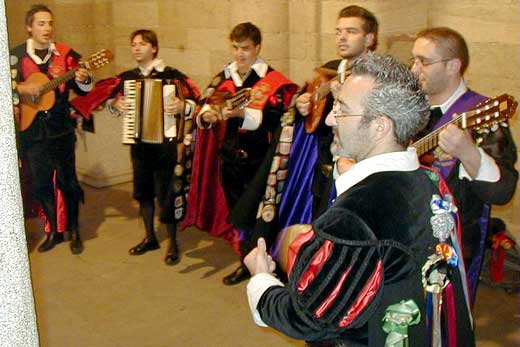
The end of the earth
I went to the pilgrim's mass this morning at the Cathedral of Santiago and heard 'peregrina de los estados unidos, puenta de la reina' read aloud along with all the others who arrived yesterday. I had not been to mass in years. A farewell lunch in a sunny little plaza with the departing members of our band of merry pilgrims and then the bus to Finisterre.
Finisterre is the tip of Western Europe. In the Middle Ages, it was thought to be the end of the earth, and people believed that if they ventured beyond it, they would drop off the edge. According to tradition, after reaching Santiago, pilgrims were supposed to make the journey to Finisterre, bathe in the sea, burn an article of clothing and watch the sunset. The next morning, they would emerge reborn, ready to start anew.
The end of the earth is still there —, a point of jagged rock jutting out into the sea covered with yellow gorse. I followed the rituals, tossing a pair of black knickers into the bonfire, and watched the sunset. I decided to take a dip in the sea tomorrow. I walked back to town, leaving behind the young lovers and a couple of cyclists. At the restaurant, I ordered fish and a salad. When the waiter came, he discreetly checked to be sure that I had eaten the cheeks (a delicacy here) and smiled when he saw that I had.
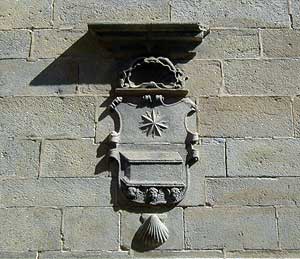
Finisterre may be on the map of Spain, but Portugal is in the air here, in the faces of the short, dark-haired people, the guttural sounds of Galician, the cuisine, the little streets that wind uphill past flowering terraces, and the bright colors of the fishing boats in the harbor, as if there were only three crayons in the box —, red, blue and green.
I said goodbye to the last stragglers from our group, so now I really am alone after the amazing sense of community I have felt all this time. On the camino, I walked by myself, relishing the solitude, but never felt lonely, as I kept meeting up with people resting under trees by the side of the road or in cafes in the evening. Today was solitary but lovely. I discovered a little cove on the other side of the presque´ile, where the water was turquoise and the beach white as snow. I stayed there for a long time, listening to the waves. It was a good way to end the camino.
Back to the “real” world
This morning, I took the train from Santiago to the French border and from there on to Paris. Every once in a while, I spotted a pilgrim or two walking in the distance. I would have given anything to be in their shoes.
It's hard to say what I have learned from this. Every stage has been a discovery —, the landscape, the flowers, the trees, even the light changed. The best part of the camino is doing it. All your senses are sharpened and you see things you would ordinarily miss, the smells are pungent and earthy, and because you are walking in silence, you hear every song of every bird.
I read somewhere that more than 60,000 pilgrims follow this route each year, for varying periods of time. So it is hardly a feat, but those who do it are somehow changed by the experience. If nothing else, walking the camino reminds us that we can do what we set our minds to do, that there will always be someone to help us on the way, and that people are basically kind if they are given the chance to show it.
I didn't find any answers to my questions —, existential or otherwise. My children are proud of me. My students are inspired. My sisters think I'm a little nuts. And I would happily start over again tomorrow.
Par


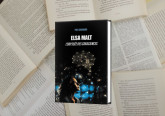
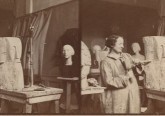


Ajouter un commentaire